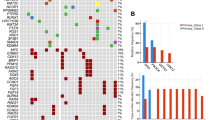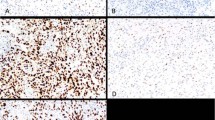Abstract
The expression of p53 protein was examined in a series of 136 primary breast carcinomas, 106 of which were analysed with a panel of four monoclonal antibodies (MAbs 1801, 240, DO7 and DO1). p53 expression was detected with at least one antibody in 40 tumours (38%), whereas only 15 tumours (14%) were positive with all four antibodies. Some variability in the immunostaining could be observed depending on the antibody used. This was noticeable both for the number of positive cells within a section and for the intensity of staining. We therefore selected a panel of 17 tumour sections (nine were highly positive, three with medium to low staining and five with low to negative staining), which we analysed by polymerase chain reaction-single-strand conformation polymorphism analysis (PCR-SSCP) for the presence of a p53 mutation at the molecular level. Mutations were identified in 15 cases. Therefore the proportion of p53-stained cells does not seem to be an exact representation of the number of cancer cells bearing a mutation within a tumour. A statistically significant correlation was observed between p53 expression, regardless of the number of positive antibodies, and grade III disease (P < 0.0001), oestrogen (P < 0.0001) or progesterone receptor negativity (P = 0.0061), increased Ki 67 index (P = 0.0018), epidermal growth factor receptor (EGFR) positivity (P = 0.0076) and aneuploidy (P = 0.037). No correlation was observed with tumour size or lymph node involvement. In univariate analysis p53 expression was not correlated with disease-free survival, in contrast to the classical prognostic parameters, which were statistically correlated. In this series p53 expression was not a marker of early recurrence.
This is a preview of subscription content, access via your institution
Access options
Subscribe to this journal
Receive 24 print issues and online access
$259.00 per year
only $10.79 per issue
Buy this article
- Purchase on Springer Link
- Instant access to full article PDF
Prices may be subject to local taxes which are calculated during checkout
Similar content being viewed by others
Author information
Authors and Affiliations
Rights and permissions
About this article
Cite this article
Jacquemier, J., Molès, J., Penault-Llorca, F. et al. p53 immunohistochemical analysis in breast cancer with four monoclonal antibodies: comparison of staining and PCR-SSCP results. Br J Cancer 69, 846–852 (1994). https://doi.org/10.1038/bjc.1994.164
Issue Date:
DOI: https://doi.org/10.1038/bjc.1994.164
This article is cited by
-
Multicentric breast cancer: clonality and prognostic studies
Breast Cancer Research and Treatment (2011)
-
Modest effect of p53, EGFR and HER-2/neu on prognosis in epithelial ovarian cancer: a meta-analysis
British Journal of Cancer (2009)
-
Prognostic implication of p53 protein expression in relation to nuclear pleomorphism and the MIB-1 counts in breast cancer
Breast Cancer (2004)
-
Overexpression of erb B2 remains a major risk factor in non-metastatic breast cancers treated with high-dose alkylating agents and autologous stem cell transplantation
Bone Marrow Transplantation (2002)
-
p53 Alteration and Chromosomal Instability in Prostatic High-Grade Intraepithelial Neoplasia and Concurrent Carcinoma: Analysis by Immunohistochemistry, Interphase In Situ Hybridization, and Sequencing of Laser-Captured Microdissected Specimens
Modern Pathology (2001)



